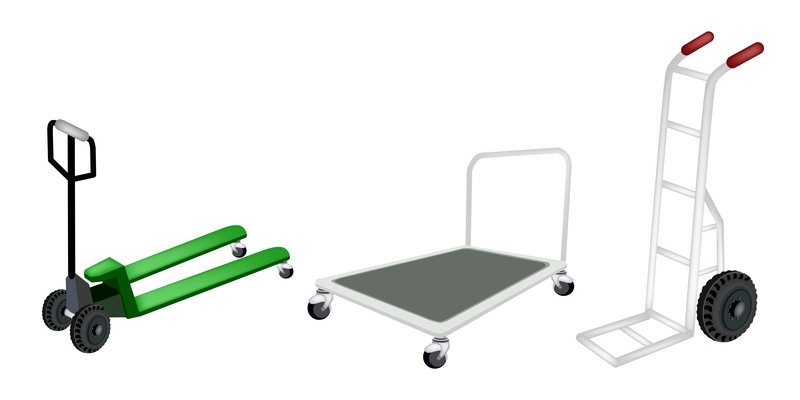Steps to Take When Relocating
Posted on 09/12/2024
Relocating to a new place is both an exciting and challenging endeavor. Whether moving to a new city for a job, to be closer to family, or simply for a change of scene, the process involves numerous steps to ensure a smooth transition. In this article, we'll cover the essential steps to take when relocating, from initial planning to the settling-in phase.
1. Plan Ahead
The most crucial step in any successful relocation is planning. Start as early as possible, ideally a few months in advance, to avoid last-minute stress.
- Create a Timeline: Outline key tasks and deadlines in a detailed timeline. This could include giving notice to your current landlord, scheduling moving services, and notifying utility companies of your move.
- Budget: Relocating can be expensive. Create a budget that includes moving costs, deposit for a new home, temporary housing if required, transportation, and other incidental fees.

2. Research Your New Area
Understanding your new location is essential for an easier transition.
- Neighborhoods: Research the neighborhoods, considering factors like safety, proximity to work or school, and amenities.
- Cost of Living: Check the cost of living in the new area. This includes housing costs, groceries, utilities, and other day-to-day expenses.
- Local Services: Identify local services, including healthcare providers, grocery stores, and recreational facilities.
3. Secure Employment
If your relocation is job-related, this step may already be taken care of. If not, it's essential to secure employment before moving.
- Job Transfer: If you're staying within the same company, discuss your transfer with HR and finalize the details.
- Job Search: Start applying for jobs in your new location well in advance. Utilize online job boards, professional networks, and recruitment agencies.
4. Find a New Home
Finding the right home is a significant part of the relocation process.
- Rent or Buy: Decide whether you want to rent or buy. Each has its pros and cons, depending on your financial situation and how long you plan to stay.
- Hire a Realtor: If you're buying, a local real estate agent can be invaluable. They know the area and can help you find a home that meets your needs.
- Inspect the Property: Once you've narrowed down your choices, visit the properties in person if possible. Look for potential issues and ensure the property meets your requirements.
5. Notify Important Parties
Before you move, make sure to notify all relevant parties of your change of address.
- Postal Service: Use the postal service's mail forwarding feature to ensure you receive all your mails.
- Utility Companies: Notify your current and future utility companies to terminate and initiate services on the moving date.
- Financial Institutions: Update your address with your bank, credit card companies, and loan providers.
- Government Agencies: Update your address with the DMV, IRS, and any other applicable governmental institutions.
6. Declutter and Downsize
Moving is the perfect opportunity to declutter and get rid of items you no longer need.
- Sort Through Belongings: Separate your items into categories: keep, donate, sell, and discard.
- Garage Sale or Online Selling: Host a garage sale or use online platforms to sell items in good condition.
- Donate: Donating items to local charities can be a fulfilling way to reduce what you have to move.
7. Hire a Moving Company
A reliable moving company can alleviate much of the stress associated with relocating.
- Research and Compare: Get quotes from multiple moving companies and compare their services and costs.
- Read Reviews: Look for customer reviews and ratings to ensure the company is reputable.
- Book in Advance: Moving companies can get booked up quickly, especially during peak times, so secure your booking early.
8. Pack Smart
Packing is perhaps the most daunting task in the relocation process.
- Start Early: Start packing non-essential items well in advance.
- Use Quality Supplies: Invest in good quality boxes, bubble wrap, packing tape, and other necessary supplies.
- Label Boxes: Clearly label each box with its contents and the room it belongs to. This will make unpacking much easier.
- Pack Essentials Separately: Pack a separate essentials box with items you'll need immediately upon arrival, such as toiletries, a change of clothes, critical documents, and basic kitchen supplies.
9. Take Care of Your Current Home
Whether you're selling or renting out your current home or ending a rental agreement, there are several things to handle before you leave.
- Clean Thoroughly: A thorough cleaning can help secure your deposit and make the home more appealing to new tenants or buyers.
- Repair Damages: Fix minor damages to avoid deductions from your deposit or issues during the sale process.
- Read Meter: Take a final reading of the water, gas, and electricity meters to ensure you're only billed for what you've used.
10. Travel Arrangements
Plan your travel to the new location.
- Plan the Route: If you're driving, plan your route and consider stops along the way.
- Book Transport: If flying or using other modes of transport, book your tickets in advance to get the best rates.
- Pet Arrangements: Ensure you've made appropriate travel arrangements for your pets.

11. Moving Day
When moving day arrives, preparation is key to ensure everything goes smoothly.
- Stay Organized: Keep important documents and valuables with you. Ensure all packing is completed before the movers arrive.
- Inventory List: Create an inventory list of all your belongings to track what's being moved.
- Supervise Loading: Supervise the loading of your belongings to ensure everything is handled with care.
12. Settle Into Your New Home
Once you've arrived at your new home, there are a few crucial steps to transition smoothly.
- Unpack Essentials: Start by unpacking your essentials box to get the immediate necessities in order.
- Check Utilities: Ensure all utilities like electricity, water, and gas are functioning properly. If there are any issues, contact the utility companies immediately.
- Personalize Your Space: Take your time to arrange your new home to your liking. Setting up a comfortable living space will help you feel more at home.
- Meet Neighbors: Introduce yourself to your new neighbors. Building a rapport can create a friendly living environment and provide valuable local insights.
Relocating is undoubtedly a significant life change that involves meticulous planning and execution. By breaking down the process into manageable steps, you can ensure a smoother transition and focus more on the exciting opportunities that await in your new location. Remember to take some time for yourself as well, and don't hesitate to seek help from friends, family, or professionals if needed. Safe moving!
Latest Posts
Time Estimate for Moving House
Career Shifts: Finding Balance Between Work and Home
Tips for Moving a Computer Securely
House moves and hare care: Preparing your rabbit for the journey







